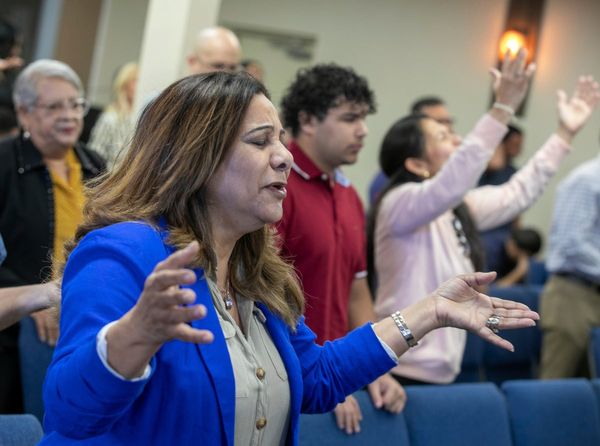The pandemic is two years in and for long periods of that people were bound by strict rules – particularly in hospitals in terms of patients and visiting them. But two years in the rules for pregnant women, and those giving birth, are not the same in different health boards.
We've shared the story of Laura Santiago. A mum to Theo, she is currently pregnant again but has had three miscarriages during the pandemic. Despite having early scans – something only offered to women where a complication is suspected – her husband was not allowed to be with her at any of those scans. It meant she started the horrific journey of dealing with baby loss by herself and after her numerous NHS scans had to go out to the car park to break the news to her husband.
Only two Covid rules in Wales remain legal requirements – masks must be worn in healthcare settings and businesses have to develop business plans. We approached each of Wales' health boards and asked their rules from the first maternity appointments through to scans, checks, and birth. The rules are different for each.
Read more: Major changes are coming to Covid testing in Wales this week
In Swansea, for example, if a woman is induced – a process that can take days – a named partner can only visit for up to two hours and at staggered times "depending on where the woman's bed is in the unit". Patients in the Betsi Cadwaladr area have to order and take lateral flow tests before attending and, while it is voluntary, if the partner chooses not to take one they may be told they cannot attend appointments or the inpatient ward. In Cardiff people visiting patients are told not to sit on the beds nor take flowers or balloons.
On Tuesday Mark Drakeford was questioned about the discrepancy during First Minister's Questions in the Senedd, He said: "As we hope to recover from the worst effects of the pandemic the Welsh Government will be offering advice to the NHS as a whole and it will for example seek to standardise the length of visits the families are able to make while somebody is in hospital, to make sure the approach to lateral flow testing is consistent across Wales, and the circumstances in which both parents can be involved is also consistent in one part of the NHS to another."
He said that was possible due to vaccinations and the way the NHS has learnt to deal with Covid. "At the depths of the pandemic the view taken by those who advise us in the Welsh Government was that sort of national approach had to give way to the need to allow clinicians to exercise the judgement only they can exercise in order to safeguard mothers and unborn children."
Betsi Cadwaladr University Health Board
Woman can have a single birth partner or nominated essential other preferably from the same household or part of an extended household. Since July 12, 2021, the health board's rules have been that birthing partners have to order and complete a lateral flow test before attending scans, appointments, labour, birth, section, or visiting inpatients.
"All partners will be required to show evidence of a negative lateral flow test result (SMS, email message, or screenshot), complete a screening questionnaire including a temperature check before entry, and will be screened for any symptoms suggestive of Covid-19 infection or other indication that require self-isolation using the national screening tool. In such circumstances the identified visitor will be requested to leave the clinical premises and return home immediately and seek PCR testing. A temperature check will also be taken and recorded on their screening form." The health board's website says: "Whilst the LFD is a voluntary test if partner or nominated other choose not to take the test then this may result in them not being able to attend appointments or attend the inpatient wards."
Partners can only attend inpatient wards with an appointment made directly with the ward/department due to limited numbers being allowed in an area at any one time. In terms of scans partners can attend the dating scan, foetal anomaly scan, and all scans or appointments. When a woman is in labour she is allowed a single birthing partner. The same is true for elective or emergency caesarean session.
In terms of midwife appointments all first appointments are via telephone to establish information with the rest in person. A partner can attend all community visits but the same rules apply, regarding lateral flow tests and Covid safety, as with hospital visits.
With regard to postnatal health visiting it is in line with Welsh Government guidance, which is similar to pre-Covid practice but with additional risk assessments. The full rules are here.
Cardiff and Vale University Health Board
Cardiff's rules were last changed in April 2021 according to their website which a spokesman directed us to when we asked for answers. The rules were last reviewed in August 2021.
Women can be supported by their birth partner at their 12 and 20-week scans and if they need to attend the Foetal Medicine Department or the Early Pregnancy Assessment Unit. All women who attend for a labour assessment can have their partner with them who can stay for the whole of labour and the immediate postnatal period. If women are not in established labour when they are assessed but want to remain in hospital their partner has to leave.
Women who are being induced can have their partner with them. Women on the first-floor maternity ward for antenatal, postnatal, or transitional care can have a maximum of one two-hour period per day being visited by one birth partner – the same one who was present during labour and birth if postnatal. That is the same whether in a side room or bay. People in odd-numbered beds can have visitors from 10am until noon and from 2pm until 4pm for those in even-numbered beds.
Women in single rooms can choose which two-hour slot they want their visitor to attend. A list of rules about what visitors should do includes wearing masks, only using public toilets, and not sitting on the beds. You can also not take flowers or balloons. Cardiff's rules are in full here.
Cwm Taf Morgannwg Health Board
Rules in this health board were changed from February 19 meaning individual birthing partners, or nominated individuals, will be able to attend antenatal appointments and scans and visit antenatal and postnatal wards for two and a half hours each day.
During labour birthing partners can be present during labour assessment and during all procedures undertaken in a single-occupancy room. When a woman reaches active labour a birth partner can remain with her throughout and until the new mum and baby are transferred to the ward.
Social distancing rules have to be maintained and people must wear a mask for the duration of their visit. Visitors to the antenatal clinic and ward areas must undertake a lateral flow test before visiting and only attend if the result is negative. They will also be asked to complete a Covid checklist before entering the clinic or ward.
A partner is allowed to attend early pregnancy scans in this health board as well as the 12 and 20-week scans and any growth scans. They can also be present if a membrane sweep is taking place on a maternity antenatal clinics or hospital site.
At the beginning of labour all women will be offered an individual assessment and the birth partner can be present. If in active labour the woman (and partner) will stay at hospital but, if not, she will be encouraged to return home. "If you decide to remain in hospital to await events the attendance of one nominated birth partner or support person will be in line with two-and-a-half-hour visiting slots on the antenatal ward areas," the guidance says.
"One nominated birth partner or support person will be able to attend with you for your caesarean birth from the time you are cared for on labour ward in a single room, throughout your birth in theatre, and for several hours after birth (until the point you are transferred to the postnatal ward)," it continues.
For women being induced a partner can visit for a two-and-a-half-hour visiting slot, which is staggered. Slots are between 10am and 12.30pm for odd-numbered beds and 2.30pm to 5pm for even beds. "These visiting times aim to avoid ward meal times and ward rounds to avoid congregation of ward," it says. If in a midwife-led care one nominated birth partner or support person will be able to attend for the duration of labour, your birth, and for all postnatal care after birth as this will be within a single-room facility.
Hywel Dda University health board
Rules were last reviewed on March 22, 2022, and said women will be able to have one person with them for all antenatal appointments and 12 and 20-week scans. The partner has to wait outside until the consultation begins when they can be telephoned to join the woman.
Women who are being induced can have a visitor for four hours but no overnight stays. Maternity patients who attend in possible labour may allocate a birth partner (preferably from the same household) to attend hospital with them during admission for labour. This includes assessment for possible labour and the birth partner may stay during the whole labour and birth. If admitted to the combined antenatal and postnatal ward they can have one daily visitor for a specified time period and a maximum of four hours. The partner and the maternity patient must wear appropriate face coverings when a member of staff enters the room and the allocated partner must remain as the only visitor during the admission period and should remain in the household bubble only to ensure reduction in risk of infection. Hours are 10am until 2pm for even beds and 2.30pm until 6.30pm for odd numbered beds. Those who are admitted via the early pregnancy unit can have someone with them for all diagnostic ultrasound appointments.
Swansea Bay University Health Board
The health board say a mum-to-be has to nominate someone as their support partner and they are the only person who can accompany her. If that person is ill or self-isolating they can choose someone else. That person will be screened when they arrive at hospital and both the patient and partner have to wear masks. Partners can attend the dating scan (usually 12 weeks) and the 20-week scan but they must wait outside until they are called in.
If you go into hospital in labour your partner can attend. If the staff decide you are not in active labour it is suggested you go home but if you decide to remain in hospital you can though your partner has to go home. The partner can return once the woman is in established labour and is transferred to the clinical area for care leading up to the birth. If you attend the antenatal assessment unit for any other reason the partner has to leave and only return once she is in active labour. If there are "complications" the partner will be "called" by maternity staff and "if there is bad news staff will talk to the partner about staying with the woman".
For women attending for a caesarean section or induction they can have a visitor only at visiting hours and it is staggered depending on where the woman's bed is in the unit. The visits are limited to two hours. If the woman is in a single room the partner can come between noon and 8pm but can only leave for toilet breaks. "They cannot come and go during this time so should bring food and drinks if they plan on staying for a while."
The named partner can be on the labour ward there for the whole of labour and "immediate postnatal period" but afterwards they are again limited to visiting hours which are staggered depending on where the woman is on the ward. Partners can't leave the ward during that time.
Women who are admitted to Neath Port Talbot Birth Centre can have their named partners present for all assessments in labour and between 10am and 10pm. Women in the Bay Birth Centre may have their named partners present for all labour assessments from 10am to 10pm. The full rules are here. Since November booking appointments for midwives have been face to face – either at home or in a community clinic.







